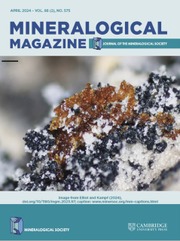Article contents
Paratooite-(La), a new lanthanum-dominant rare-earth copper carbonate from Paratoo, South Australia
Published online by Cambridge University Press: 05 July 2018
Abstract
Paratooite-(La) is a new lanthanum-dominant rare-earth copper carbonate from the Paratoo copper mine, near Yunta, Olary district, South Australia. Paratooite-(La) occurs as sheaves and radiating sprays of blade-like to tabular pale blue crystals in thin fissures in a slaty country rock. Individual crystals are typically 50–200 μm in maximum dimension but <5 μm thick. Associated minerals include donnayite-(Y), kamphaugite-(Y), and bastnäsite-(La). Electron microprobe and CHN analyses gave: La2O3 26.47; Pr2O3 7.74; Nd2O3 8.15; Sm2O3 0.66; Gd2O3 0.85; Y2O3 0.72; CaO 7.57; SrO 3.15; Na2O 3.3; CuO 5.77; F 0.24; CO2 32.05; NO2 1.12; -O=F -0.10; sum 100.03, yielding an empirical formula of (La3.54Ca2.94Na2.32Nd1.05Pr1.03Sr0.66Y0.14Gd0.10Sm0.08)Σ11.86Cu1.58(C15.84N0.53)O47.76F0.24. The simplified formula is (REE ,Ca,Na,Sr)6Cu(CO3)8 or possibly REE3(Ca,Sr)2NaCu(CO3)8. The mineral is pale turquoise-blue to pale blue in colour, transparent, with a pearly to vitreous lustre and a pale blue streak. No cleavage was observed but the morphology and TEM studies indicate a cleavage parallel to ﹛100﹜. The Mohs hardness is estimated to be 4. The strongest lines in the X-ray powder pattern are [dobs (Iobs) (hkl )]: 5.047 (53) (200); 4.786 (49) (021); 3.957 (43) (220); 3.468 (43) (012, 221); 2.927 (100) (202); 2.530 (52) (241); 2.344 (22) (420,103); 2.232 (20) (421). A synchrotron powder diffraction pattern was indexed on a primitive orthorhombic cell with a = 10.0862(5), b = 12.8088(6), c = 7.2360(4) Å, V= 934.8(1) Å3 and Z = 2. The crystal structure of the new mineral could not be determined but powder diffraction data indicate the space group is probably P 222, Pmmm , P 2221 or Pmm2. The measured density is 3.68(3) g/cm3 and the calculated density is 3.78 g/cm3. Paratooite-(La) is biaxial negative with α = 1.605(3), β = 1.696(3) and γ = 1.752(2); pleochroism is medium strong; X very pale bluish, Y and Z bluish (with greenish tint) with absorption Z ≈ Y >> X. Paratooite-(La) is a supergene mineral which precipitated from mildly basic carbonated groundwaters. The mineral is named for the type locality.
- Type
- Research Article
- Information
- Copyright
- Copyright © The Mineralogical Society of Great Britain and Ireland 2006
Footnotes
Current address: The Australian Synchrotron, 800 Blackburn Road, Clayton, Victoria 3168, Australia
References
- 6
- Cited by


